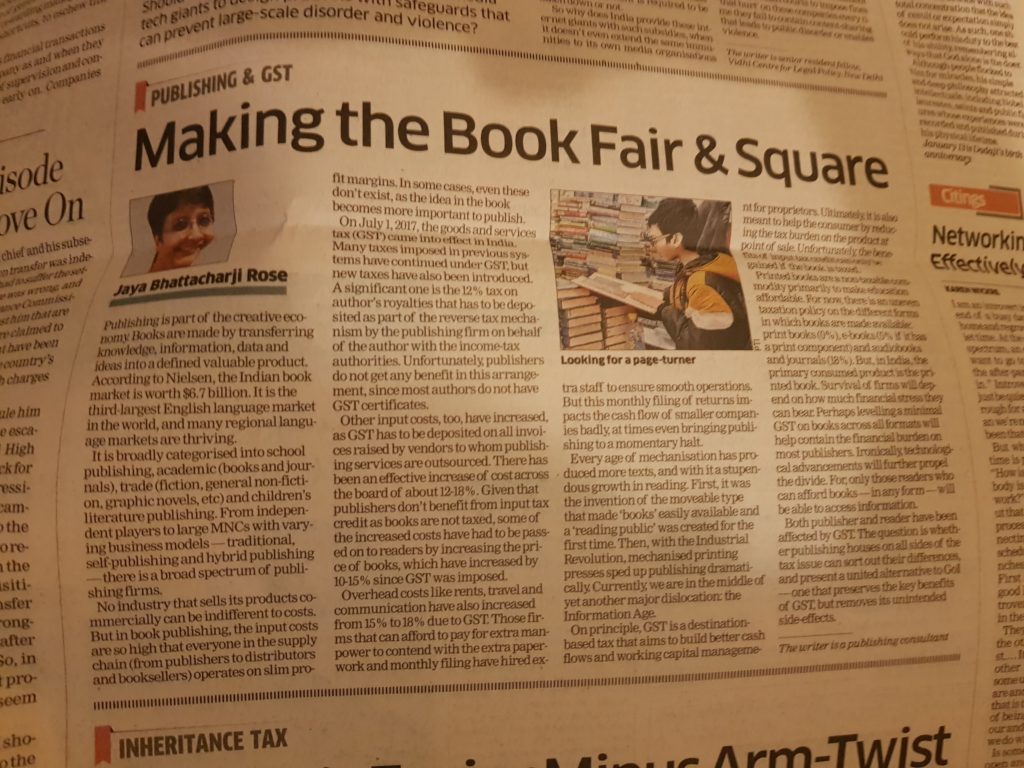Publishing & GST: Making the book fair & square
My article on “GST and publishing” has been published in the Economic Times on 12 January 2019. The original url is here. I am also C&P the entire article below. I had first written about the impact of GST and publishing within a week of the new taxation system coming into effect on 1 July 2017. My article was published on 8 July 2017. Here is the link.

Publishing is part of the creative economy. Books are made by transferring knowledge, information, data and ideas into a defined valuable product. According to Nielsen, the Indian book market is worth $6.7 billion. It is the third-largest English language market in the world, and many regional language markets are thriving.
It is broadly categorised into school publishing, academic (books and journals), trade (fiction, general non-fiction, graphic novels, etc) and children’s literature publishing. From independent players to large MNCs with varying business models — traditional, self-publishing and hybrid publishing —there is a broad spectrum of publishing firms.
No industry that sells its products commercially can be indifferent to costs. But in book publishing, the input costs are so high that everyone in the supply chain (from publishers to distributors and booksellers) operates on slim profit margins. In some cases, even these don’t exist, as the idea in the book becomes more important to publish.
On July 1, 2017, the goods and services tax (GST) came into effect in India. Many taxes imposed in previous systems have continued under GST, but new taxes have also been introduced. Asignificant one is the 12% tax on author’s royalties that has to be deposited as part of the reverse tax mechanism by the publishing firm on behalf of the author with the income-tax authorities. Unfortunately, publishers do not get any benefit in this arrangement, since most authors do not have GST certificates.
Other input costs, too, have increased, as GST has to be deposited on all invoices raised by vendors to whom publishing services are outsourced. There has been an effective increase of cost across the board of about 12-18%. Given that publishers don’t benefit from input tax credit as books are not taxed, some of the increased costs have had to be passed on to readers by increasing the price of books, which have increased by 10-15% since GST was imposed.
Overhead costs like rents, travel and communication have also increased from 15% to 18% due to GST. Those firms that can afford to pay for extra manpower to contend with the extra paperwork and monthly filing have hired extra staff to ensure smooth operations. But this monthly filing of returns impacts the cash flow of smaller companies badly, at times even bringing publishing to a momentary halt.
Every age of mechanisation has produced more texts, and with it a stupendous growth in reading. First, it was the invention of the moveable type that made ‘books’ easily available and a ‘reading public’ was created for the first time. Then, with the Industrial Revolution, mechanised printing presses sped up publishing dramatically. Currently, we are in the middle of yet another major dislocation: the Information Age.
On principle, GST is a destination based tax that aims to build better cash flows and working capital management for proprietors. Ultimately, it is also meant to help the consumer by reducing the tax burden on the product at point of sale. Unfortunately, the benefits of input tax credit can only be gained if the book is taxed.
Printed books are a non-taxable commodity primarily to make education affordable. For now, there is an uneven taxation policy on the different forms in which books are made available: print books (0%), e-books (5% if it has aprint component) and audiobooks and journals (18%). But, in India, the primary consumed product is the printed book. Survival of firms will depend on how much financial stress they can bear. Perhaps levelling a minimal GST on books across all formats will help contain the financial burden on most publishers. Ironically, technological advancements will further propel the divide. For, only those readers who can afford books — in any form — will be able to access information.
Both publisher and reader have been affected by GST. The question is whether publishing houses on all sides of the tax issue can sort out their differences, and present a united alternative to GoI —one that preserves the key benefits of GST, but removes its unintended side-effects.
12 January 2019

